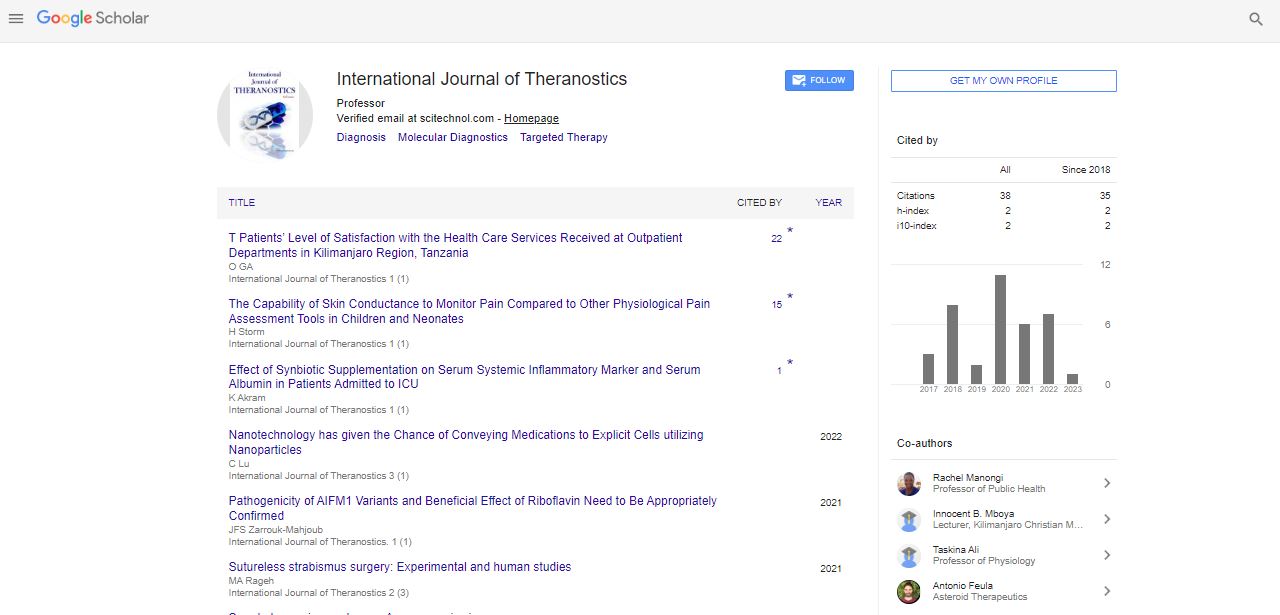Opinion Article, Int J Theranostic Vol: 12 Issue: 1
Targeted Therapy in Cancer Treatment : Its Advantages and Complications
Jenny Dhooge*
Department of Gastroenterology, University of Paris, Paris, France
*Corresponding Author: Jenny Dhooge
Department of Gastroenterology, University of Paris, Paris, France
E-mail: dhoogejenny0075@aphp.fr
Received date: 03-Feb-2023, Manuscript No. IJT-23-95543;
Editor assigned date: 06-Feb-2023, PreQC No. IJT-23-95543 (PQ);
Reviewed date: 20-Feb-2023, QC No IJT-23-95543;
Revised date: 27-Feb-2023, Manuscript No. IJT-23-95543 (R);
Published date: 07-Mar-2023 DOI: 10.4172/IJT.100122.
Citation: Dhooge J (2023) Targeted Therapy in Cancer Treatment : Its Advantages and Complications. Int J Theranostic 12:1.
Keywords: Molecular Imaging, Nanotheranostics, Pharmacotherapy
Description
Targeted therapy is a type of cancer treatment that uses drugs or other substances to identify and attack cancer cells while leaving healthy cells unaffected. The goal of targeted therapy is to interrupt the signals that cancer cells use to grow and divide. It is a type of precision medicine that is tailored to each individual's unique cancer characteristics, such as the genetic mutations that are driving the growth of the cancer.
Targeted therapy is a relatively new approach to cancer treatment that has emerged in the last few decades. It is based on the idea that cancer cells have certain characteristics that can be exploited by drugs or other substances to specifically target and kill them. Unlike traditional chemotherapy, which attacks all rapidly dividing cells in the body, including healthy cells, targeted therapy only attacks cancer cells, leading to fewer side effects.
There are several different types of targeted therapy, including small molecule inhibitors, monoclonal antibodies, and immunotherapies. Small molecule inhibitors are drugs that can target specific enzymes or proteins that are involved in cancer growth and survival. They work by blocking the activity of these enzymes or proteins, which can slow or stop the growth of cancer cells. Monoclonal antibodies are proteins that are designed to bind to specific targets on cancer cells, such as receptors or proteins on the cell surface. By binding to these targets, monoclonal antibodies can block the signals that cancer cells use to grow and divide. Immunotherapies are a type of targeted therapy that uses the body's own immune system to fight cancer. They work by stimulating the immune system to recognize and attack cancer cells.
One of the key advantages of targeted therapy is that it can be more effective than traditional chemotherapy for certain types of cancer. For example, some cancers have specific genetic mutations that can be targeted with drugs, such as Epidermal Growth Factor Receptor (EGFR) inhibitors for lung cancer or v-raf murine sarcoma viral oncogene homolog B1 inhibitors for melanoma. By targeting these specific mutations, targeted therapy can be more effective at killing cancer cells and shrinking tumors than traditional chemotherapy.
Another advantage of targeted therapy is that it can be less toxic than traditional chemotherapy. Because targeted therapy only attacks cancer cells, it can spare healthy cells from the toxic effects of chemotherapy. This can lead to fewer side effects and a better quality of life for patients undergoing treatment.
Despite its many advantages, targeted therapy is not a cure for cancer. Like all cancer treatments, targeted therapy has limitations and can be associated with side effects. Some cancer cells may be resistant to targeted therapy, and tumors can develop new mutations that render targeted therapies ineffective. In addition, targeted therapy can be expensive, and not all patients may have access to the latest treatments.
Targeted therapy is an important tool in the fight against cancer, but its limitations should be considered. It should be used in conjunction with other treatment modalities, and individualized treatment plans should be developed based on the patient's specific cancer profile. Ongoing research and development in this field will likely lead to more effective and personalized treatments for cancer patients in the future.
 Spanish
Spanish  Chinese
Chinese  Russian
Russian  German
German  French
French  Japanese
Japanese  Portuguese
Portuguese  Hindi
Hindi 